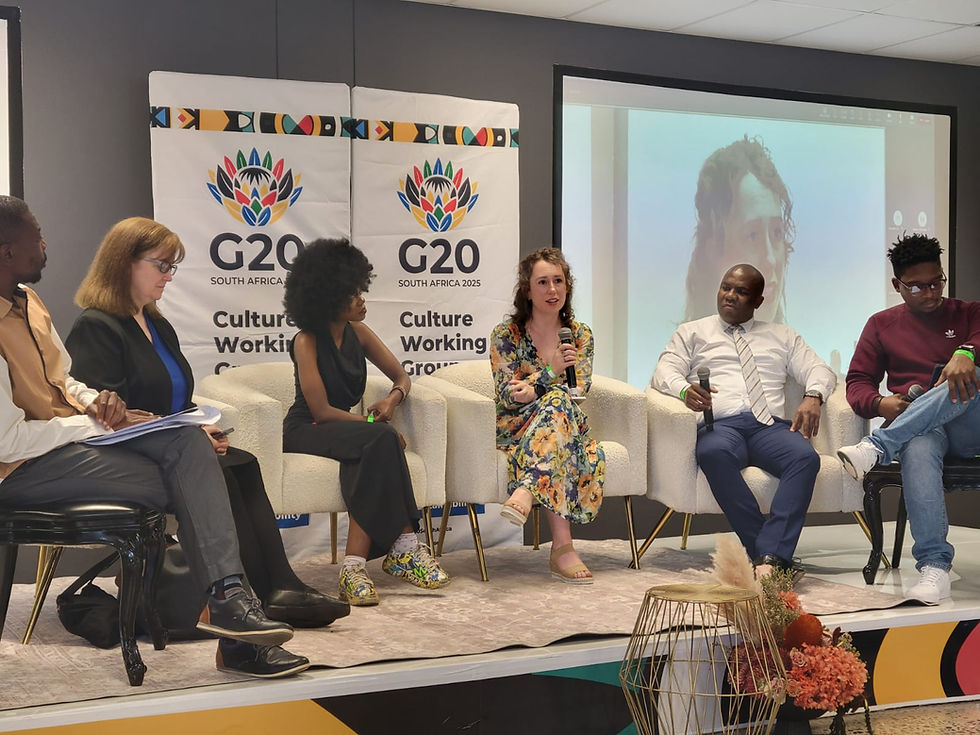Cindy Friedman Keynote at the AI Collective’s Durban Launch: Why AI Ethics Matters More Now Than Ever
- EthicEdge

- Oct 1, 2025
- 4 min read
The AI landscape in South Africa is evolving rapidly, and the recent launch of the AI Collective’s Durban chapter on 18 September 2025 stands as a clear testament to this momentum. The event drew participants from a wide range of disciplines and industries, each bringing unique perspectives and expertise. Yet despite their differences, they were united by a shared conviction: that AI holds transformative potential, not only as a tool, but as a catalyst for ethical progress and inclusive innovation that can shape South Africa’s future.
With AI ethics at the centre of the conversation, the evening’s highlight was the keynote delivered by Dr Cindy Friedman, co-founder and co-director of EthicEdge. Cindy’s presentation “AI Ethics: Why It Matters Now More Than Ever”, offered both clarity and provocation, sparking meaningful dialogue amongst attendees about the challenges and opportunities of AI in today’s world.
Operational vs. Contextual Values
One of Cindy’s most compelling contributions was her introduction to the distinction between operational values and contextual values in AI systems.
Operational values are the principles built into AI systems to ensure they run as intended. These are values such as accuracy, security, and reliability. They are essential but often narrow in scope,and more focused on performance within technical boundaries.
Contextual values, on the other hand, extend far beyond the technical. They encompass the cultural, ethical, and societal considerations that shape how AI affects people in real-world contexts. Cindy discussed example
s of contextual values, that can help pave the way to more ethical AI: (1) social justice and equity; (2) community trust and legitimacy; (3) cultural norms and practices; (4) economic inclusion and opportunity; (5) linguistic and educational diversity; (6) democratic participation and political voice; and (7) environmental sustainability.
By separating these two concepts, Cindy emphasised that building ethical AI isn’t just about making systems work well, it’s also about ensuring they work well for people and societies. This framing encouraged attendees to think about AI not only as a technological challenge but as a profoundly human one.
Sparking interdisciplinary dialogue
Cindy’s keynote quickly became a springboard for broader discussions that underscored the value of interdisciplinary collaboration. Attendees reflected on the reality that AI cannot be developed in isolation. Computer scientists, ethicists, educators, policymakers, environmentalists, and business leaders all have a role to play in ensuring that AI is beneficial and aligned with human values.
Some of the themes that emerged included:
Bias in AI: Concerns about embedded biases in training data and algorithms remain pressing. Discussions highlighted the importance of transparency, testing, and diverse teams in building fairer systems.
Generative AI in education: With tools like ChatGPT and image generators becoming mainstream, questions were raised about how they could both support and undermine learning. There was recognition of the opportunities to enhance education, but also awareness of risks such as plagiarism, misinformation, and over-reliance on machines.
Deepfakes and synthetic media: The growing ease of creating hyper-realistic videos was acknowledged as both a creative opportunity and a social risk. Conversations focused on media literacy and safeguards against disinformation.
AI and environmental sustainability: While AI can be used to model climate change and optimise energy use, its environmental cost (particularly the energy demands of large-scale models) was another area of concern.
Jobs and the future of work: Automation continues to raise questions about job displacement and reskilling. Attendees reflected on how South Africa, with an already high unemployment rate in particular, can prepare for shifts in the labour market.
The role of policy: Regulation and policy frameworks were recognised as critical levers for ensuring accountability, preventing harm, and supporting innovation responsibly.
Putting KwaZulu-Natal on the AI Map
Perhaps just as exciting as the content of the discussions was the symbolic importance of the event itself. For too long, conversations about AI in South Africa have been concentrated in traditional hubs such as Johannesburg and Cape Town. The Durban launch of the AI Collective signals a shift, shining a light on KwaZulu-Natal (KZN) as an emerging centre for innovation and dialogue.
The event underscored the region’s potential to contribute meaningfully to the national and global AI conversation. It also demonstrated that the appetite for collaboration and knowledge-sharing extends across provinces and communities.
Gratitude and looking ahead
None of this would have been possible without strong support. We are deeply grateful to Capitec for hosting the event, and to the AI Collective for their vision in creating a platform that fosters dialogue and collaboration around AI in South Africa and beyond.
The Durban launch was just the beginning. With AI developing at breakneck speed, it is crucial to have ongoing spaces where diverse voices can come together to grapple with its ethical, social, and technical dimensions. Events like this help ensure that the future of AI is not only innovative but also inclusive, responsible, and aligned with human well-being.
As Cindy Friedman reminded us, good AI is more than functionality and good operationalisaton. Good AI is also ethical AI which considers contextual values. At EthicEdge, we emphasise that AI is more than machines learning from data, it’s about people deciding what kind of future we want when we build these technologies. Our future will be shaped by the choices we make now, and by the values we embed in both our systems and our societies.
We look forward to many more inspiring events from the AI Collective and to seeing KZN firmly established on the AI map in South Africa and beyond.





Comments